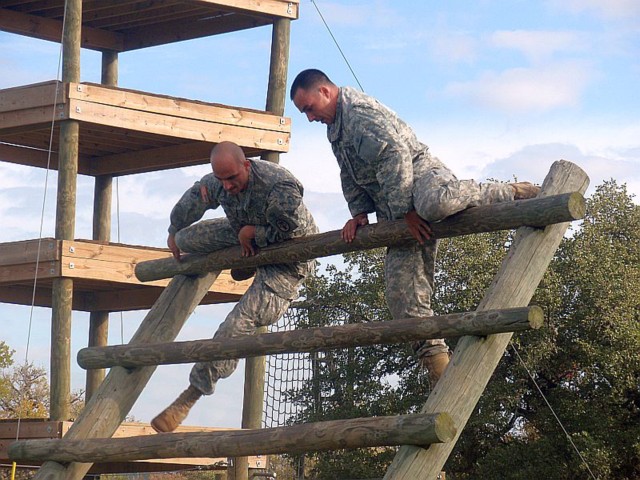PINELLAS PARK, Fla. - Two Army Reserve Soldiers were named the top medic team in the Army during the 7th Annual Expert Field Medical Competition (EFMC).
Staff Sgt. Bjoern J. Pietrzyk and Sgt. Charles L. Smith, from the 5502nd United States Army Hospital (USAH), Aurora, Colo. won the best medic team title after besting 35 other teams. The EFMC is an annual competition featuring a continuous and realistic simulated combat environment in which medical Soldiers endure 72 hours of challenges over six days.
This year's competition was held at Camp Bullis, Texas from October 19-24, 2009. The competition is the most strenuous of any Army Medical Department (AMEDD) competition due to the extreme physical and mental demands.
To qualify for the EFMC, competitors must have the Expert Field Medical Badge (EFMB) or the Combat Medical Badge (CMB).
Staff Sgt. Pietrzyk and Sgt. Smith were mobilized, and attached to the Heidelberg, Germany Medical and Dental Activity (MEDDAC) when they competed in the European EFMC competition. Their victory in Europe qualified them for the 2009 AMEDD EFMC.
"Winning the European Regional Medical Competition (ERMC) was a must in order to compete in the AMEDD Expert Field Medical Competition," said Smith. "The competition was very intense and it definitely prepared both of us physically and mentally for the AMEDD competition," he added. "The European Regional Medical Competition not only put on a great competition, but it helped me progress in my field medic skills."
The eight events, six day competition consisted of:
A physical fitness assessment; An 18-station obstacle course; Weapons qualification on both the pistol and rifle; Testing on warrior tasks from the Soldiers Manual of Common Tasks; A six-hour land navigation challenge; A written test on medical procedures; A reaction-style evaluation event, where the teams carried aid bags and equipment while conducting medical operations in a tactical combat casualty care environment; Medical and casualty evacuation tests; Warrior skill tests; Communication and written tests; and lastly, a 16-mile foot march with full combat load.
For Pietryzk and Smith the road march was the toughest part of the competition.
"We didn't know the final distance while marching, it was a tough race against the others" said Smith. "When we saw the finish line, it just happened to be 16-miles later."
According to Pietryzk, the final road march at the end of the 72- hour competition took everything out of him.
"I never felt as broken as I did during the last 500 yards of the 16-mile march; I had to kick myself in order to push through," he said. "It was by far the hardest road march I had ever completed."
Pietryzk believed 'feeling' the other teams behind him made him push his limits. Smith stated that each competitor had their strengths and were very good. He had no idea who was near the top and winning was quite a surprise at the end.
The competition consisted of 35 team allocations, distributed among all Army commands. Teams represented units from across the continental U.S. and locations overseas, including: Alaska, Hawaii, Germany, Italy and Korea.
Pietryzk has been in the Army Reserve for almost 6 years. He deployed to Iraq and Germany.
"I'm a firefighter and my employer, the Littleton Fire Rescue (Littleton, Colo.) fully supports me when I'm on my deployments," he said.
Smith has mobilized twice in his 3-years of service, once to Fort Carson Evans Army Community Hospital and once to Heidelberg. He is a diagnostic radiology technician with Exempla Good Samaritan Medical Center, Lafayette, Colo.
"My employer, not only supported me, but they constantly communicated with me during my deployment," he said.
Pietryzk and Smith contribute their success to the 5502nd's constant training throughout the year and the 100% support the Heidelberg MEDDAC gave them.
"It didn't matter to MEDDAC that we were Reserve Soldiers filling in downrange," said Smith.
"Our Soldiers in Heidelberg kept us on our feet," said Pietryzk.
While serving in Germany, both Soldiers were given the opportunity to participate in the German Army Proficiency Badge, the Berlin Marathon, German Army Shooting Badge and German Army Sports Badge that helped them in their success for the win Pietryzk encourages every medic to go for this title.
"I will never forget what I learned and would like to see more Army Reserve Soldiers enter the EFMC," he said.
###
Editor's note: If you are interested in participating in the 2010 EFMC visit https://www.us.army.mil/suite/page/621281.


Social Sharing